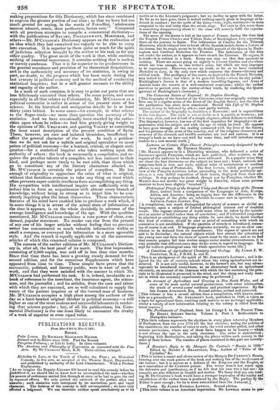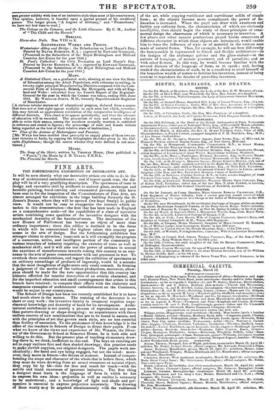PUBLICATIONS RECEIVED.
Front March 8th to March 14th. BOOKS.
Palm Leaves. By RICHARD MORCETON MILNES. Ireland and its Ruler's since 1829. Part the Second.
Peregrine Pultuney ; or Life in India. In three volumes.
The Anatomy and Philosophy of Expression as connected with the Fine
Arts. By Sir CHARLES BELL, K.H. Third edition, enlarged.
Richelieu in Love, or the Youth of Charles the First ; an Historical Comedy, in five acts, as accepted at the Theatre Royal, Haymarket, and prohibited by authority of the Lord Chamberlain. With a Preface Explanatory. [As we imagine the Deputy-Licenser felt bound to read this comedy before he prohibited it, we should like to know bow he accomplished the task—whether hie powers of endurance carried him through at once, or he had to gain the end by repeated efforts. We only carried the outwork of the preface after two assaults; such obstacles were interposed by its matterless, pert, and vapid character. The fortress of the comedy is still unvanquisbed ; we have only effected a lodgment. We can therefore neither speak conclusively as to its
merits or to the Licenser's judgment ; but we incline to agree with the latter. So far as we have gone, there is indeed nothing openly gross in language or in- decent in conduct ; but the spirit of the thing—tone, style, sentiment—is more congenial to the real lobby than the mimic stage. Yet even in this sense there is something disappointing about it : the close will scarcely fulfil the expecta- tions of the opening.
The scene of the drama is laid at the court of France, during the time that the English Prince Charles and Villiers Duke of Buckingham were sojourning there on the journey to Spain. The infatuation of Charles for the Princess Henrietta, which induced him to break off the Spanish match, forms a feature of the drama, but its staple seems to be the double pursuit of the Queen by Buck- ingham and Cardinal Richelieu the Premier. The indecorum of this does not strike the author, as it appears to have struek the Licenser. He argues, it is trutk—it is written in a book. Every one may see that this amounts to nothing. There are scenes going on nightly in Covent Garden and elsewhere which are true enough, in this writer's sense, but which are very improper to be represented. However, we see no truth, so far as we have examined Richelieu in Love, in the only view which concerns the drama—literary and critical truth. The profligacy of the court, as depicted in the French Memoirs, may indeed be there; but where is its graceful levity—where its airy polish? Buckingham's licence is that of a modern travelling bagman, and Anne of Austria lacks the reserve of a well-conducted courtesan; whilst the author contrives to pervert even the matter-of-fact truth, by rendering the Queen ignorant of Buckingham's character.]
The Cistercian Saints of England : St. Stephen Harding,
[This biography of the founder of the Cistercian order was originally written to form one of a regular series of the Lives of the English Saints; but the idea of the publication has since been abandoned. Should this Life of St. Stephen succeed, it may be followed by others, now partly written.
The author of the biography is, doubtless, a Romanist ; and is superstitions to the last degree. The style is not so feeble as it is puerile or feminine; yet it is easy, clear, and not devoid of a simple elegance, albeit delicate to sickliness. The biographer, however, has one of the first requisites for biography—an ac- quaintance with his subject and with the age in which he lived. He appears to have gone through all the reading connected with the lives of the Saints;, and his pictures of the state of the country, and of the religious characters and economy of the eleventh and twelfth centuries, are real and curious. It is as strange a book as we have met with for some time, and will introduce many readers to a new mental world.]
Lectures on Certain High- Church Principles commonly designated by the term Puseyism. By THOMAS MADGE. [Mr. MADGE appears to be a Dissenting minister, who delivered a series of discourses against Puseyism, which are here published, after revision, at the request of the audience to whom they were addressed. In a popular sense they are about the best discourses on the subject we have met ; broad, rational, and temperate both in tone and style, without taint of sectarianism or needless offence to any class of Protestants. The first lecture, which gives a general view of the Puseyite doctrines before proceeding to the more particular opi- nions, is a very skilful exposition of their tenets, displayed from their own writings. It may perhaps be doubted, though not by Puseyites, whether Mr. MADGE does not ascribe too great weight to Ftiotnse, whom some persons consider to have been slightly "touched."] Philological Proofs of the Original Unity and Recent Origin of the Human Race, derived from a comparison of the Languages of Asia, Europe, Africa, and America: being an inquiry how far the differences in the languages of the globe are referrible to causes now in operation. By ARTHUR JAMES JOHNES, Esq. [A compilation, not much distinguished for nicety of acumen or skilful ars rangement, upon a subject of limited philological interest and of doubtful,, result. The cognate character of words must often be taken by the uniniti- ated as matter of belief rather than of conviction; and if inferential conjecture be admitted as establishing any thing within its own circle, we doubt whether this kind of evidence should be used as proof of something with which its connexion is not established. if the question of miracle is introduced, reason- ing of course is at end. If language originates naturally, we see no clear con- clusion to be deduced from its resemblances. The organs of speech are not said to be dissimilar; the natural objects which first attract the attention of the young race and form the roots of speech must be the same; and as we find that remote peoples fall into similar usages under similar circumstances, it is very probable that different races may do the same in regard to lang_uage. Ex- cept tnr indirect philological uses, the whole speculation seems idle.] A Catechism of Agricultural Chemistry and Geology. By JAMES F. W. JOHNSTON, M.A., F.R.SS. L. and E. [This is an abridgment of the spirit of Mr. JOHNSTON'S Lectures ; and is de- signed for the use of country-schools where the rising agriculturists are in- structed. It is not only useful, however, to the farmer's son, but may advan- tageously be introduced everywhere, as an elementary book on agricultural: chemistry, on account of the clearness with which the fact containing the prin- ciple to be illustrated is presented to the mind, and the cheap and ready man- ner in which the necessary experiments may be performed.] An Account of Agriculture and Grazing in New South Wales, and of
some of its most useful natural productions, with other information,
the result of several years' residence and practical experience. By the late JAMES ATKINSON, Esq. Second edition, revised and corrected. [This volume is less a second edition than a eompilation, with known mate- rials as a groundwork. Mr. ATKINSON'S book, published in 1826, is taken as a basis for agricultural facts, omitting such matters as are no longer applicable; whilst a variety of new information relating to the colony is added from the latest sources.] The Parliaments of England, from 1st George L to the Present Time. By Barmy STooics Sutra. Volume I. Part I. Bedfordshire to . Hampshire inclusive. [This little volume represents the elections in every place returning Members of Parliament, from the year 1714 till the last election ; noting the politics of the candidates, the number of votes to each, the total number pelted, and other minute particulars, where any of these facts happen to be known which. is not always the case in the early elections. The order is alphabetical; beginning with Bedfordshire, and taking the places within each county in the order of their letters. The number of places contained in this part are seventy- three.] A Russian's Reply to the Marquis De Custine's "Russia in 1839." Edited by BEERY J. BRADFIELD, Esq., Author of "Tales of the Cyclades," &c. [This is rather a smart and clever review of the Marquis DE Cusannves Russia, running over the weak points of the book and making fun of the weaknesses of the author : but it is useless as a defence of the Emperor and the Empire, or: as a neutralizer of the CUSTINE poison. The writer stands too much upim. the defensive and justificatory, as if he felt that his case was a bad one his remarks are also deficient in breadth and matter. We fancy that any one read- ing M. DE CUSTINE'S book would have a stronger impression of the vanity arid' onesidednes of the author than is produced by the Reply. The preface by the Editor is poor enough ; for he is more autocratical than the Autocrat."
Poems. By JAMES RUSSELL LOWELL. Second edition. [This little volume is an American importation. Mr. Lovrxrm seems to pa=
seas greater solidity with less of an imitative style than most of his countrymen. This opinion, however, is founded upon a partial perusal of his occasional poems. The longer pieces, " A Legend of Brittany," and " Prometheus," we have not had time to read.]
The Cottage on the Common, and the Little Gleaners. By C. M., Author of " The Child and the Hermit."
SERIALS.
Horse-shoe Nails. Nos. VIII to X.
ILLUSTRATED WORKS AND PRINTS.
Westminster Abbey and Bridge : the Debarkation on Lord Mayor's Day. Painted by DAVID ROBERTS, R./I..; engraved by EDWARD GOODALL. (Presented to the Subscribers of the Royal Birmingham and Midland Counties Art-Uniou for the year 1844.) St. Paul's Cathedral : the Civic Procession on Lord Mayor's Day. Painted by DAVID ROBERTS, R.A. ; engraved by EDWARD GOODALL. (Presented to the Subscribers of the Royal Birmingham and Midland
Counties Art-Union for the year 1844.) MAPS.
A Statistical Chart, on a graduated scale, showing at one view the State of Education among the Adult Population, with reference to writing, in twenty-eight principal Manufacturing Districts compared with the Com- mercial Ports of Liverpool, Bristol, the Metropolis, and with all Eng- land and Wales : calculated from the Fourth Report of the Registrar- General for the year in which the Census was taken, ending 30th June 1841. By WILLIAM JOHms, M.D., formerly Superintendent-Registrar of Manchester.
[A curious tabular statement of educational progress, deduced from a source that does not at first eight appear available to such uses, but which, neverthe- less, may furnish an approximate calculation of the comparative intelligence of different districts. This chart is to appear periodically, and thus the advance of education will be recorded. The proportion of men and women who are able to write their names among the numbers annually married, is exhibited in columns and stated in figures; the percentage of male and female writers being regarded as the teat of their relative state of instruction.] °•"" Plan of the Actions of Maharajpoor and Funnier. t Mr. WILD has been enabled thus promptly to supply plans of these two re- cent victories in India, by copying the lithographic sketches given in the Cal- cutta Englishman; though the source whence they were derived is not men- tioned.]
Music.
The Song of the Shirt; written by THOMAS HOOD, (first published in " Punch,") the Music by J. H. 'ft: LLY, T.R.D.L. The Pianista for March.



























 Previous page
Previous page